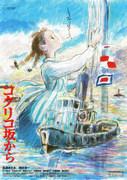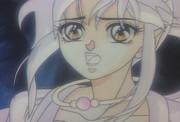A thorough review of the appeal and emotion of "From Up on Poppy Hill"!

"From Up on Poppy Hill": A Ghibli masterpiece where youth and history intersect■Overview of the work"From Up on Poppy Hill" is an animated film produced by Studio Ghibli and released in 2011. Directed by Goro Miyazaki and based on a manga by Chizuru Takahashi and Tetsuro Sayama, it tells a moving story about youth and history. It was released on July 16, 2011, distributed by Toho, has an Eirin rating of 119035, a total running time of 91 minutes, and one episode. Copyright belongs to "© 2011 Chizuru Takahashi, Tetsuro Sayama, Studio Ghibli, NDHDMT". ■ StorySet in Yokohama in 1963, this is a story about the encounter and growth of 16-year-old Umi Matsuzaki, who runs a boarding house called "Upon Boarding of Poppy Hill" on a hill overlooking the harbor, and 17-year-old boy Shun Kazama, who commutes to school by tugboat. Every morning, Umi raises a signal flag toward the sea, sending a message that she "prays for a safe voyage." Shun sees the flag and becomes interested in the sea. With the Tokyo Olympics coming up the following year, people were tearing down the old and believed that only the new was wonderful. Meanwhile, a dispute arose at a high school in Yokohama over the demolition of the "Quartier Latin," a building filled with history and memories that houses the cultural clubs. Shun appeals to the students to protect the building, and Umi suggests that they do a thorough cleaning to show how good it is. The two gradually become attracted to each other, but then they are faced with a certain test: the fact that they may be siblings. However, instead of running away from reality, the two move forward and learn how their parents met, loved, and lived during the war and the chaotic period after the war. And what future did they find? ■Explanation"From Up on Poppy Hill" is a multi-layered work that is both a youth film and a historical drama. 18 years after the end of the Pacific War, Japan made a miraculous recovery from the ruins and was in the midst of high economic growth. With the Tokyo Olympics just around the corner, people destroyed the old and believed that only the new was wonderful. However, the sea was still blue, the green was shining, the sky was wide, and the world was full of hope and sparkling. The youth of Umi, Shun, and others lived in an era when they were poor but everyone was trying to move forward with their hopes up. And by focusing on the secret of the protagonists' birth, we go back to the war and post-war youth of their parents. In a time of chaos, it was common to raise children who had lost their parents as your own. It depicts the youth of an era when the boundary between self and others was ambiguous and people were tolerant of many things. By depicting the youth of two generations of parents and children during the period of high economic growth, the war, and the chaotic period after the war, the theme that our history has continued like this is highlighted. It is a film that asks the audience, "What kind of era are we living in?" ■Cast
■ Main staff
■ Main Characters
■ Theme songs and music
■ Evaluation and impressionsAmong Studio Ghibli's works, "From Up on Poppy Hill" is especially highly regarded as a work that depicts youth and history. Director Goro Miyazaki was influenced by his father Hayao Miyazaki, but he created the story from his own unique perspective. In particular, this youth drama set in Japan in the 1960s realistically depicts the social situation and people's feelings of the time, deeply moving the audience. It also deals with universal themes by depicting the growth of young people and their involvement in society through the relationship between Umi and Shun and the issue of preserving the Latin Quarter. The music is also one of the charms of this work, and the theme song "Goodbye Summer - From Up on Poppy Hill" sung by Aoi Teshima plays a role in further deepening the emotion of the story. In addition, famous Showa era songs such as "Ue o Muite Arukou" and "Shiroi Hana no Saku Koro" are effectively used as insert songs, and they are an element that makes you feel the historical background. The cast is also impressive, with Masami Nagasawa and Junichi Okada's acting realistically portraying the youth of Umi and Shun. In particular, Masami Nagasawa's role as Umi realistically portrayed her growth and conflicts, leaving a strong impression on the audience. Veteran actors such as Keiko Takeshita and Yuriko Ishida also play supporting roles, adding depth to the story. ■ Recommendation points"From Up on Poppy Hill" can be enjoyed as both a youth film and a historical drama. In particular, the story, set in Japan in the 1960s, depicts the social situation and people's feelings at the time realistically, deeply moving the audience. In addition, the relationship between Umi and Shun and the issue of preserving the Latin Quarter portray the growth of young people and their involvement in society, dealing with universal themes. Music is also one of the attractions of this work, and the theme song "Goodbye Summer - From Up on Poppy Hill" sung by Teshima Aoi plays a role in further deepening the emotion of the story. In addition, famous Showa era songs such as "Ue o Muite Arukou" and "Shiroi Hana no Saku Koro" are used effectively as insert songs, and they are an element that gives a sense of the historical background. The cast is also luxurious, and the acting of Nagasawa Masami and Okada Junichi realistically expresses the youth of Umi and Shun. In particular, Nagasawa Masami's role as Umi realistically portrayed her growth and conflict, leaving a strong impression on the audience. Veteran actors such as Takeshita Keiko and Ishida Yuriko also play supporting roles, adding depth to the story. Related informationAmong Studio Ghibli's works, "From Up on Poppy Hill" is highly regarded as a work that depicts youth and history. Director Goro Miyazaki was influenced by his father Hayao Miyazaki, but he created the story from his own perspective. In particular, this youth drama set in 1960s Japan realistically depicts the social situation and people's feelings at the time, deeply moving the audience. In addition, it deals with universal themes by depicting the growth of young people and their involvement in society through the relationship between Umi and Shun and the issue of preserving the Latin Quarter. The music is also one of the attractions of this work, and the theme song "Goodbye Summer - From Up on Poppy Hill" sung by Aoi Teshima plays a role in further deepening the emotion of the story. In addition, famous Showa era songs such as "Ue o Muite Arukou" and "Shiroi Hana no Saku Koro" are used effectively as insert songs, and they are an element that gives a sense of the historical background. The cast is also luxurious, and the acting of Masami Nagasawa and Junichi Okada realistically expresses the youth of Umi and Shun. In particular, Masami Nagasawa's performance as Umi made a strong impression on the audience, as she portrayed her growth and struggles realistically. Veteran actors such as Keiko Takeshita and Yuriko Ishida also play supporting roles, adding depth to the story. Conclusion"From Up on Poppy Hill" is a Studio Ghibli masterpiece that depicts youth and history. Director Goro Miyazaki was influenced by his father Hayao Miyazaki, but he created the story from his own perspective. In particular, this youth drama set in 1960s Japan realistically depicts the social situation and people's feelings at the time, deeply moving the audience. In addition, it deals with universal themes by depicting the growth of young people and their involvement in society through the relationship between Umi and Shun and the issue of preserving the Latin Quarter. Music is also one of the attractions of this work, and the theme song "Goodbye Summer - From Up on Poppy Hill" sung by Aoi Teshima plays a role in further deepening the emotion of the story. In addition, famous Showa era songs such as "Ue o Muite Arukou" and "Shiroi Hana no Saku Koro" are used effectively as insert songs, and they are an element that gives a sense of the historical background. The cast is also luxurious, and the acting of Masami Nagasawa and Junichi Okada realistically expresses the youth of Umi and Shun. In particular, Masami Nagasawa's performance as Umi realistically portrayed her growth and struggles, leaving a strong impression on the audience. Veteran actors such as Keiko Takeshita and Yuriko Ishida also play supporting roles, adding depth to the story. From Up on Poppy Hill is a work that can be enjoyed as both a coming-of-age film and a historical drama, and is sure to leave a deep impression on the audience. |
>>: The appeal and evaluation of the movie Pokémon Best Wishes: Victini and the Black Hero Zekrom
Recommend
The Chinese trailer of the new film "Bad Boys 3" is very exciting to chase the murderer
Today (December 31), the "New Year Countdown...
EXAM-RAI -Roppongi Jigokujo Chapter- Review: A fusion of innovative story and visuals
Comprehensive evaluation and recommendation of Ex...
The latest trailer for the TV animation of the famous game "Muv-luv" will be broadcast in 2021
The TV animation "Muv-luv Alternative",...
Captain America 4: General Ross wants to reorganize the Avengers
At the American International Film Industry Confe...
Appeal and evaluation of the second season of Mupon: new adventures and deepening of characters
MooPon [2nd Season] - In-Depth Review and Compreh...
The appeal and reviews of TAILENDERS: A thorough explanation of the thrill of the space race and the depth of the characters
TAILENDERS: A tale of space and friendship "...
Review of "The Edge of the Forest: The Adventures of Shakkuri": A moving journey and its appeal
"The Adventure of Shakkuri at the Edge of th...
Magical Girl Lyrical Nanoha A's - Appreciated for its in-depth storyline and character development
Magical Girl Lyrical Nanoha A's - Deep Bonds ...
The King of Comedy, a TV adaptation of Stephen Chow's masterpiece, starts filming and is exclusively broadcast on iQiyi
Today, December 2, the TV series "The King o...
The character relationship poster of "Jiang Ziya" was released, revealing the origin story of the film
The animated film "Jiang Ziya" released...
Mobile Suit Gundam III: Encounters in Space: A Thorough Analysis of the Emotional Climax and Profound Themes
The appeal and evaluation of "Mobile Suit Gu...
Gakuen Tokusou Hikaruon: A fusion of youth and mystery, why should you watch it?
Gakuentokusou Hikaruon - Gakuentokusou Hikaruon o...
Japanese manga artist Shirato Sanpei dies of pneumonia at age 89
According to Japanese media reports today on Octo...
"Violin of the Starry Sky": A thorough review of the moving melody and depth of the story
Starry Sky Violin - Hoshizoranoorin The animated ...
Henry Cavill says he hasn't given up on playing James Bond
Adapted from the best-selling book "The Unge...









